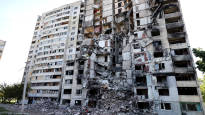KHARKIV The huge apartment building in Pohjois Saltivka district feels deserted. Some of the apartments have traces of the war: the outer wall is burnt, the window is covered with a plywood board, the balcony has collapsed.
However, there is a buzz in front of one crab. Forty-something in front of the moving truck Iryna instructs the workers where any piece of furniture goes.
He is cleaning out his parents’ apartment, which was badly damaged in a fire a year ago.
– The parents lived on the fourth floor, and the missile hit the apartment two floors below, Iryna says and shows the house from the outside.
The Russian troops got to the nearest ring road, only a few hundred meters from the house. However, Iryna’s elderly parents had time to leave for the evacuation center before the shooting intensified.
The walls and furniture of Iryna’s parents’ apartment have been blackened from the impact. Now Iryna plans to go through all the items with the workers and examine what can still be saved and what goes straight to the landfill.
– We are worried about the floorboards, because the fire burned under them for two days. No one knows how strong the boards are, whether it is possible to live here or how safe it is to live here, Iryna says in the living room.
No plan to rebuild
Before the war, Kharkiv’s North Saltivka was one of the largest suburbs in Ukraine. More than 300,000 people lived there. As a result of the fire, approximately 70 percent of the buildings have either been completely destroyed or damaged.
Now that the war has been over for almost a year and a half, Pohjois-Saltivka still looks like a ghost town. Life has not returned much: there are clearly fewer people on the streets than elsewhere in Kharkiv, and only a couple of small grocery stores and pharmacies are open. They also opened their doors only in March of this year.
The residents feel that the government and city administration have forgotten Pohjois Saltivka.
– We have been forgotten. There is no help from the state. There is no clear plan for what to do in the area, Iryna complains.
He compares the situation in North Saltivka to Butša and Irpin, located near Kyiv, where reconstruction has been in full swing since the liberation of the cities.
And Iryna is not the only one who feels that way. In June, residents of Pohjois Saltivka organized a small demonstration in front of the worst affected residential building located on Natalia Užvii street.
The damage to the 16-story building in question has been visited by numerous foreign delegations, the President of Ukraine Volodymyr Zelenskyi and UN High Commissioner for Refugees Filippo Grandi. Still, no help has arrived.
Some of the residents have lived through the war
In northern Saltivka, it has been possible to rebuild in a few places, but it is only a drop in the ocean. In the house of Iryna’s parents, only a couple of apartments have been repaired during the year, and the residents left in the house have to survive in the middle of a construction site.
No one knows how many residents the district has now. The city administration has calculated that almost 4,000 houses and 50,000 apartments have been damaged in Kharkiv due to the war.
One of the people who lived in North Saltivka throughout the war is a neighbor of Iryna’s parents Yuri. He has an apartment through the house, of which only one of the three rooms has been damaged.
– I was lucky because there is only one room on the side where the missile hit. The other rooms remained in a decent condition, Juri says.
Juri has had to spend part of the wartime in the basement, sometimes even for weeks.
– Mentally, it is very difficult to return to normal life and live at home again after being underground for so long.
Although life in a ghostly neighborhood is not easy, Yuri, who lives alone, has no other place to move to. Almost all the neighbors have left, and he is mostly accompanied by his dog named Lukerja.
The lively cocker spaniel has not survived the war intact. As a result of the explosions, it lost its sight last year.
– A really sad incident, but now Lukerja is even more sensitive to touch, and has a great need to examine people with his muzzle, Juri says.
